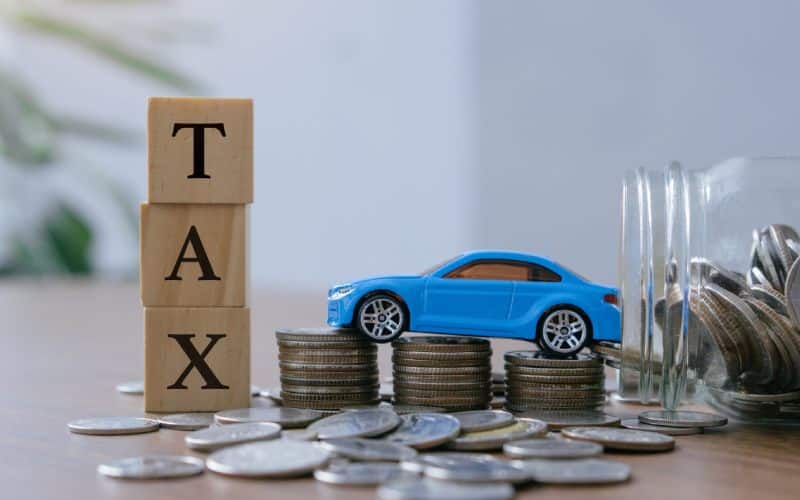In 2022, Canada implemented a new luxury car tax. This tax, officially known as the Luxury Tax on High-Value Vehicles, aimed to address the growing issue of wealth inequality while generating additional revenue for the Canadian government.
While it also applies to other high-value vehicles, such as aircraft and other vessels, many Canadians are impacted mostly by how it affects luxury cars.

What Is The Select Luxury Items Tax Act?
The Canadian Select Luxury Items Tax Act is new legislation that taxes certain high-value vehicles, aircraft and boats, as a luxury tax. It includes personal luxury vehicles.
This luxury car tax on high-value vehicles was introduced as part of the federal budget for 2022. Its primary purpose was to target high-end vehicles, such as those with a manufacturer’s suggested retail price (MSRP) exceeding the set threshold of $100,000. The tax, which went into effect on January 1, 2022, imposed an additional levy on the purchase of these luxury vehicles.
What Is a Subject Vehicle?
The Canadian Luxury Car Tax Act defines subject vehicles as motor vehicles primarily intended for transporting individuals on public roads. These vehicles must meet certain criteria: they must be manufactured after 2018, have four or more wheels in contact with the ground, possess a gross vehicle weight rating of 3,856 kg or less, and accommodate no more than 10 individuals. Subject vehicles encompass a wide range of vehicle types, including sedans, convertibles, light-duty pickup trucks, SUVs, minivans, and more.
Any improvements or car modifications made within the first year of purchase may be subject to the luxury tax. That doesn’t include repairs, maintenance, or cleaning.
Used vehicle dealers must ensure previous taxes were paid on these vehicles. Subject vehicles previously registered under the Act are exempt from the luxury tax.
The luxury tax does not apply to specific vehicle categories, including motorcycles, snowmobiles, vehicles not intended for road use, police cars, hearses, ambulances, medical response vehicles, fire response vehicles, and recreational vehicles.
How Does The Tax Impact a Luxury Car or Subject Vehicle?
The luxury car tax applies to cars and trucks with a manufacturer’s suggested retail price of over $100,000 purchased or leased after August 2022.
The luxury tax applies in situations where the possession and ownership of that car are transferred after August 2022. However, if you had a written agreement in place before April 20, 2021, the luxury tax would not be applicable.
How Is The Luxury Tax Calculated?
The luxury tax is determined by taking the lower of two calculations based on the taxable amount. You would pay 20% of the retail sale price over the threshold ($100,000 for vehicles) or 10% of the retail sale price of the subject vehicle overall, whichever is lower.
For example, if you purchase a car with an MSRP of $120,000, the luxury tax would be calculated as the lessor of:
- 20% of $20,000 = $4,000 ($120,000 sale price – $100,000 threshold)
OR
- 10% of $120,000 = $12,000
The luxury tax in this example would be $4,000.
Note that the taxable amount does not include any PST, GST, HST, or QST, but does include customs fees and tariffs that apply to the subject vehicle.
What Is The Taxable Amount?
For sales, the taxable amount includes the total of the sale price and any charges for improvements provided by the seller or related party. If the sale is for a minimal or no cost amount, or is at a price lower than the fair market value, the fair market value is used.
For leases, the taxable amount is the fair market value.
When Is The Luxury Tax Payable?
The luxury tax must be paid during a sale when the purchaser either takes possession or gains ownership of the item, whichever happens first. With leases, it’s payable when the lessee first gets the right to use the item. For imports, it’s generally due at the time of importation, unless the importer is a registered vendor of the item.
Impact to Consumers
Unsurprisingly, the introduction of the luxury car tax has led to higher prices for high-end vehicles in Canada. If you bought a luxury car in August 2022 or later, or are in the market for luxury cars, you need to budget for both the vehicle’s purchase price and the associated tax.
The tax has made luxury cars less accessible, so you may choose to instead purchase less expensive alternatives or avoid a purchase altogether.
Many luxury car dealerships have had to adjust their pricing strategies and marketing approaches to cater to the changing landscape, however, and may offer financing options and promotions to mitigate the impact of the luxury car tax.

Impact to Your Taxes
The specific impact on your overall taxes paid will depend on your individual financial circumstances, including your income, expenditures, and financial choices. It’s advisable to consult with a tax professional or financial advisor to understand how these changes may affect your personal or business tax situation.
However, with the new luxury tax, an individual buying a subject vehicle will see an increase in the taxable amount, as the value of the vehicle is added to their income for tax purposes.
If you are in the pharmacy industry, and are concerned about how these and other changes in the Canadian tax system may be impacting your personal and business tax returns, Pharma Tax offers comprehensive tax planning and filing services, tailored for pharmacy owners and pharmacists.
- With The New Capital Gains Tax Changes for 2024, What are the Best Places to Tax Shelter My Money? - November 1, 2024
- Business Overhead Insurance: What it is & Why You Need It - October 18, 2024
- How Long Do I Need to Keep Receipts? - October 5, 2024


